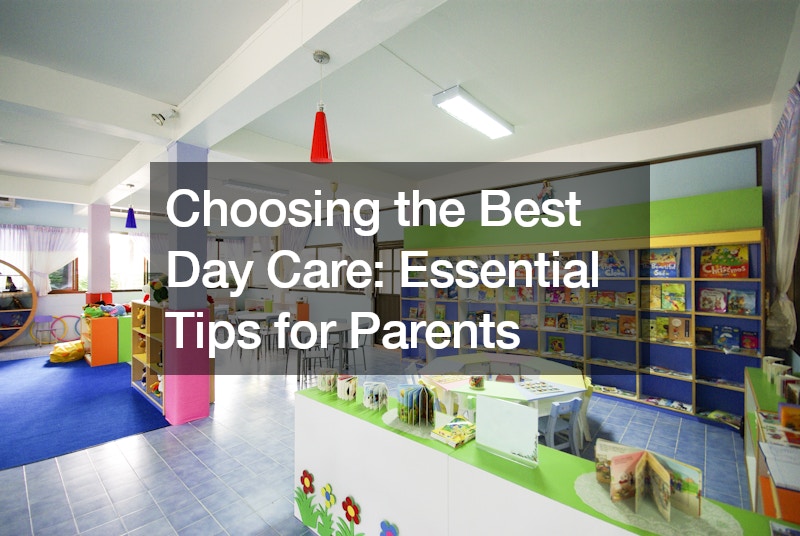Selecting a day care center is a significant step for any growing family. The decision involves entrusting the well-being, safety, and early development of your child to a third party. With numerous options available, making the right choice requires careful consideration. Here are some essential tips to guide parents in choosing the best day care for their little ones.
1. Prioritize Licensed Day Care Centers:
The first crucial step in the selection process is to focus on licensed day care centers. While licensing requirements may vary from state to state, all states have some form of a licensing process.
This process doesn’t guarantee a flawless day care experience, but it ensures that the facility complies with fundamental health, safety, and care regulations. By prioritizing licensed centers, parents lay the groundwork for a secure and regulated environment for their children.
2. Conduct a Thorough Observation:
Setting up a time to visit and observe the day care center is imperative. During the visit, pay close attention to both the staff and the children. Evaluate whether the staff members are attentive, caring, and actively engaged with the children. Observe the children to determine if they appear happy, comfortable, and actively involved in activities. Assess how the staff handles distressed children and inquire about the types of toys and activities offered. Additionally, take note of the spaces designated for eating, napping, and play. A comprehensive observation provides valuable insights into the daily dynamics of the day care center.
3. Ask Pertinent Questions:
Being proactive in gathering information is crucial when choosing a day care center. Ask questions about the caregiver-to-child ratio, as this can significantly impact the quality of care your child receives. Inquire about the center’s philosophies on discipline, play, and learning. Understanding these aspects helps align your expectations with the day care’s approach. Don’t hesitate to seek the opinions of other parents dropping off their children. Their experiences can offer valuable perspectives and insights into the day-to-day functioning of the center.
4. Trust Your Instincts:
While gathering information and observing the day care center are essential steps, it’s equally important to trust your instincts. Parents have a natural ability to sense whether a particular environment feels right for their child. Pay attention to your gut feelings during the visit and when interacting with staff and other parents. If something doesn’t align with your expectations or makes you uncomfortable, it’s crucial to consider alternative options. Trusting your instincts ensures that the chosen day care center resonates with your child’s needs and your family’s values.
5. Consider Location and Accessibility:
The location of the day care center is another crucial factor to consider. Choose a center that is conveniently located to your home or workplace, as this can ease the daily commute and minimize stress for both you and your child. Additionally, consider the center’s accessibility in terms of parking facilities and public transportation options. A well-located day care center can streamline your daily routine and enhance the overall experience for you and your child.
6. Assess Cleanliness and Safety Measures:
Cleanliness and safety are paramount when selecting a day care center. Take note of the cleanliness of the facility, including play areas, restrooms, and eating areas. Ensure that the center follows proper hygiene practices and sanitation protocols to minimize the risk of illness and infection. Additionally, inquire about the center’s safety measures, such as emergency protocols, staff training in CPR and first aid, and secure entry and exit procedures. A safe and hygienic environment provides peace of mind for parents and promotes the well-being of children.
7. Evaluate Communication Channels:
Effective communication between parents and staff is essential for a positive day care experience. Inquire about the center’s communication channels, including how updates and information are shared with parents. Consider whether the center encourages open communication and welcomes parental input and feedback. Clear and transparent communication fosters trust and collaboration between parents and staff, ensuring that the child’s needs are met effectively.
In conclusion, choosing the best day care involves a multifaceted approach that considers various factors, including licensing, observation, questioning, instinctual feelings, location, cleanliness, safety measures, and communication channels. By prioritizing these essential aspects, parents can make an informed decision that prioritizes the well-being and development of their child in a nurturing and secure day care environment. Remember, the goal is not just to find a day care but to find the best one that aligns with your child’s needs and your family’s values. With careful consideration and thorough research, parents can embark on this important journey with confidence and peace of mind.
.


